#trc negativity
Text
and fuck pynch !
#sorry this has been years in the making just#they work good as a metaphor that's never even completed#but like whyyyyyy is ronan anywhere near adam's level why does ronan never get to change#why does ronan's repeated unchanging antics not just eventually piss adam off enough to force him to or leave#like damn#trc#trc negativity#t
1 note
·
View note
Text
insane that declans entire character revolves around the exhaustion of being parentised his entire life and at AGED 21 all he wants is like 1 singular weekend off. Which he could easily do if RONAN took any amount of responsibility at all. And this went on for 4+2 books. And then you know how Greywaren ended??? it ended with Ronan fucking off zero responsibility and declan still raising Matthew and worrying that now BOTH HIS WIFE and his brother could drop any moment bc of their stupid as fuck dreamers
#IM GOING TO KILL MYSELFFFFFF#i would be okay if it was characterised as a negative ending but ITS SUPPOSED TO BE POSITIVE?!#this is like a declan kinnie worst ending. What do you Mean I'll Never Be Free#trc#cdtheu#declanposting
197 notes
·
View notes
Text
all thats keeping me together rn is that old wheel they found at the bottom of a lake in cabeswater that promised they would one day have more adventures together
#greywaren ruined me guys (negative connotation)#anyways#gangsey please start fighting back against the divorce allegarions im begging you#trc#the raven boys#blue sargent#richard gansey#adam parrish#ronan lynch
58 notes
·
View notes
Text
ronan lynch is not needy. ronan lynch has needs. ronan lynch is not falling apart. ronan lynch is a work in progress. ronan lynch is not a car crash. ronan lynch is a star exploding. ronan lynch is a dreamer. ronan lynch is a brother. ronan lynch is a friend. ronan lynch is a partner. ronan lynch is. ronan lynch is. ronan lynch is ronan lynch is ronan lynch is ronan lynch is
#fixing ronan’s negative self talk#the love i have for him jesus#i’m a mess tonight can u tell?#mine#trc#ronan lynch#adam parrish#the raven cycle#blue sargent#richard campbell gansey iii#adam and ronan#the raven boys#blue lily lily blue#pynch#henry cheng#the dream thieves#gangsey#the gangsey#blusey#declan lynch#tdt#matthew lynch#greywaren#call down the hawk#mister impossible
164 notes
·
View notes
Text
it's ESPECIALLY not romantic for adam to want to leave his relationship but to be unable to because of codependent attachment. and then we never examine that further or address that it's fucked up. and we never interrogate anything about what this means for his independence or autonomy or ability to set healthy boundaries in his future/marriage. i will not lie to you guys that shit made my skin CRAWL. adam break tf up with your boyfriend and get your life together i swear to GOD,
#like the adam content in gw started out SO strong i was pumping my FISTS at 'don't call me again' AND THEN.#'our relationship is great cuz i can't leave without wanting to kill myself. this is exactly what i wanted for all of trc.'#'it's super emblematic of my goals and struggles' you guys fucking Know i'm not one of those adam fans but like.#JUSTICE FOR ADAM PARRISH. EAUGH.#greywaren negativity#greywaren spoilers#greywaren#i've sat on this one for a long time aside from jokes bc no one else seems to be as skeeved out by it but like#some of you guys must feel skeeved right??? it can't just be me????#like half of you are just happy he's happy and half of you don't like him in the first place i'm p sure. BUT IT CAN'T JUST BE ME??
47 notes
·
View notes
Text
if there's one thing my latest trc reread has taught me is that i project onto ronan way too much
#caught myself multiple times but i just cant stop#ronan lynch#in tears because a character said or thought something remotely negative about him..............seek help etc#trc
12 notes
·
View notes
Text
#s speaks#no because originally I was going to do option a but … ngl the idea is not sparking much joy :/. But then maybe I’ll like some things bette#… although other things bound to be worse… that’s why I think properly reading Shiver could be a good break because I DNFed it originally#and my memory of what I did read is negative. So by my logic if I read that then went back to tdt it wouldn’t be as depressing a jump as#trc to tdt it makes sense in my head. Also I do want to read those properly before that adaptation#but then on the other hand maybe hate reading a book to be funny is not a good use of my time and I should read something I know will be#good like Silvia Moreno Garcia. What do you guys think?
1 note
·
View note
Text
If you disagree with my posts then pls just ignore them and do NOT reblog them with tags telling me why you disagree and why I’m so “wrong”
#especially when it’s my fandom posts#I’ve had enough#make your own post then#and talk about it but don’t spread negativity under my posts#trc#personal
0 notes
Text
anyways since the theme of post-TRK seems to be that every single character ignores any development they had and gets worse, I'm listing everything out here + with a rating of how likely I, the authority of everything ever, think it was. greywaren spoilers obviously
1. Declan: Decides Dad was good all along, disregards real actual emotional abuse and parentification as "misremembering" how great Niall was. 6/10. CDTHEU Declan is a very different character to TRK Declan, I still think he's been too self aware throughout to suddenly walk it back THIS severely. I predict a severe breakdown for him age 30 since I've never witnessed someone do Denial as their last stage of grief.. it’s gonna be explosive
2. Ronan: Disregards his family for the majority of his arc, is worse to them than in TRC. does not call gansey for months. finds a new FP instead of a therapist. emotionally worse off. does find himself via terrorism I guess? 9/10. pretty on brand for Ronan to go scorched earth and suffer zero consequences. I do wish he was made aware of his birth circumstances and displayed the same love/grief for aurora/niall that he's shown in every book except greywaren. are you telling me he can look at the New Fenian and be OKAY?????
3. Adam: ‘Reinvents’ himself, suffers, lies, suffers again. Does not call gansey. Suffers in the VoidSpace, apparently with no lasting consequences. becomes a narc. 7/10. I was hoping for a more self aware adam post TRK but him choosing to pull a Henry Cheng is also pretty on brand. wish he'd actually broken up with Ronan for at least a week. him becoming a narc is unfortunately pretty accurate to character but government jobs are not famously well paying so it really does feel random? the only thing he’s done that’s close to sleuthing is inventing pedo murder charges for his teacher/keeping with the bryde stuff. plus he's still not utilizing his magic skill so this just feels like a continuation of the Harvard arc for the rest of his life which is REALLY baffling when u compare how many times TRK insists he's a magician and will remain a magician/psychic despite everything. seems he's growing MORE disconnected with himself. i’m all for negative development but it’s really being framed as a happy ending which is baffling ngl
4. Gansey: has a sociology degree + is only associated with blue (and nobody else) in the 4-5 years since TRK. Completely reversed his stance on henrietta being home, on "I'd take all of you anywhere with me", on his dedication to history/archeology. does not seem too concerned about Ronan going insane, still odd despite the time he's had to get used to it. 5/10. horrible representation of gansey but I DO like that he's focusing on himself instead of raising pynch. as i say this i remember the ring thing and grit my teeth. complete ignorance of Henry AFTER his whole "friends forever and ewer" TRK thing gives me a good playground to make things worse so I like it but it's definitely weird. how did being a teenager specifically suck for you king because I think Being Dead trauma is unrelated to age
5. Matthew: nearly found independence + love in the abrasive way that lynches give it, then was disregarded emotionally and still not given an apology for the Everything from declan. 8/10. extremely on brand for the lynches to not hold each other accountable. Matthew seems to have improved somewhat + Declan is less overbearing about him, so I like it, I'll take it
6. Henry: went into Seondeok's black market low level mob business, got divorced?, does not speak to bluesey. 10/10. it’s so bad. absolutely off brand for the entire theme of him rejecting the Orders his mother who Literally Forced him to come to henrietta gave him (did not begin this game looking for a friend etc). refutes the entire "find your own something more" theme, refutes the "three of us" theme, refutes the "im going to make something great" motives. and I love it. TRULY my worst ending for Henry is becoming yet another fairy market nepotism casualty. he will Literally never escape and it’s FANTASTIC it is so much fun. Ha Ha You Have Become Your Mother
7. Fenian/Mor: live at the fucking barns now. 1/10. you are telling me a series whose entire THING is based on growing up/overcoming grief/moving on ends with THE FUCKING LYNCH FAMILY BACK AT THE BARNS?????????? WHAT THE HELL???? WHY IS EVERYONE OKAY WITH ANY OF THIS??????????????????????????????????????????????????
#mostly i want to reference this and see if my eventual reread changes my opinions#greywaren#dreamer trilogy#cdtheu#mstief
211 notes
·
View notes
Note
Hey hi! Hope you're feeling better! 💖 For the fanfic ask: 5, 12, and 15, please?
hiiii! thanks for the ask! and i just got a negative covid test this morning, haven't had symptoms for a few days so 🎉 thanks for asking!
5. What’s a crackship you love?
I used to be a huge Mystrade fan (Mycroft Holmes and Greg Lestrade in BBC Sherlock) and I think they maybe interacted once in a dream sequence in canon. In TRC, I've been reading every ship even Adam/Declan, Adam/Ronan/Kavinsky, etc. I think @mychemicalrachel mentioned Adam/Bryde and I would read that in a heartbeat lol
12. Friends with benefits or secret dating?
Why not both? hehe secret fwb is great. I love that. but if I had to choose probably friends who are secretly dating (hiding it from their friend group). I love the dramaaaaaa
15. Post the last line you wrote without context.
"His eyes widened and he opened his mouth to speak - apologize or excuse, she wasn’t sure - but she didn’t give him the chance."
6 notes
·
View notes
Note
Why do you think seishirou gave syaoran the feather? that's not like him
Seishirou never straight out said he planned to give Syaoran the feather, but this scene confirms it more or less
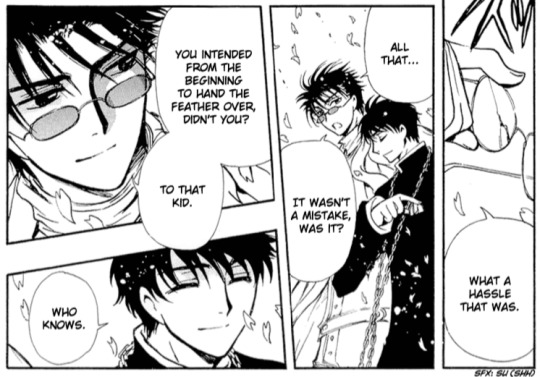
Fuuma is his brother, he knows him the best out of rest of cast. Especially since, as Kurogane said in TWC, they're same at core.
Now keep in mind 1) there's no direct confirmation why he gave up the feather so we can only speculate 2) with characters such as Seishirou, you can never be sure of their motives
It was a puzzlement for me too. Sakura's feathers are powerful, why would he give up something that could be big advantage during battles/his search? I used to think he used that feather to fight (sword + those shadowy things, idk how to call them really)
Until I reread end of Outo arc and saw this:
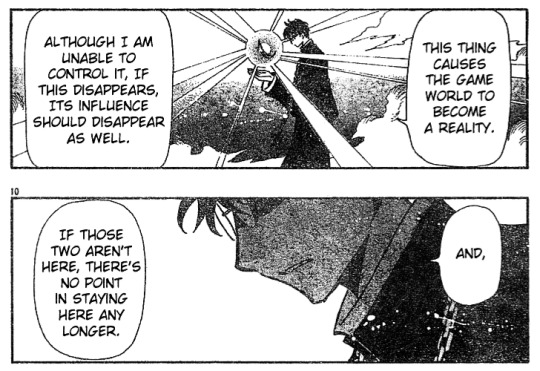
Seishirou presumably got that feather in Outo (I'm not 100% on that one). Feather is powerful, it has ability to turn virtual world into reality - but he can't control it. Feather is basically useless to him.
Now it was never made clear how precisely he fights. But I assume it's magical abilities, like main crew has. So feather doesn't effect Seishirou's powers, positively or negatively.
But if that's so, why didn't he give Syaoran feather back in Outo? He kept feather because he could, no reason deeper than that.
You see, Seishirou is type of man to do what he wants, whenever he wants, on a whim. He doesn't really care much about anything but how to catch up with vampire twins. In Outo he left as soon as he found out twins weren't there; in Nihon he planned to leave immediately too but Syaoran stopped him; later when Fuuma is talking with Souma and Kendappa he apologizes on Seishirou's behalf for leaving without announcement. When he found out Fai had Kamui's blood Seishirou attacked him impulsively (a bad move on his part because he'd lose that 1-vs-3 fight) - in nutshell, he only cares about one thing and acts somewhat impulsive when wish to catch up with twins is in question.
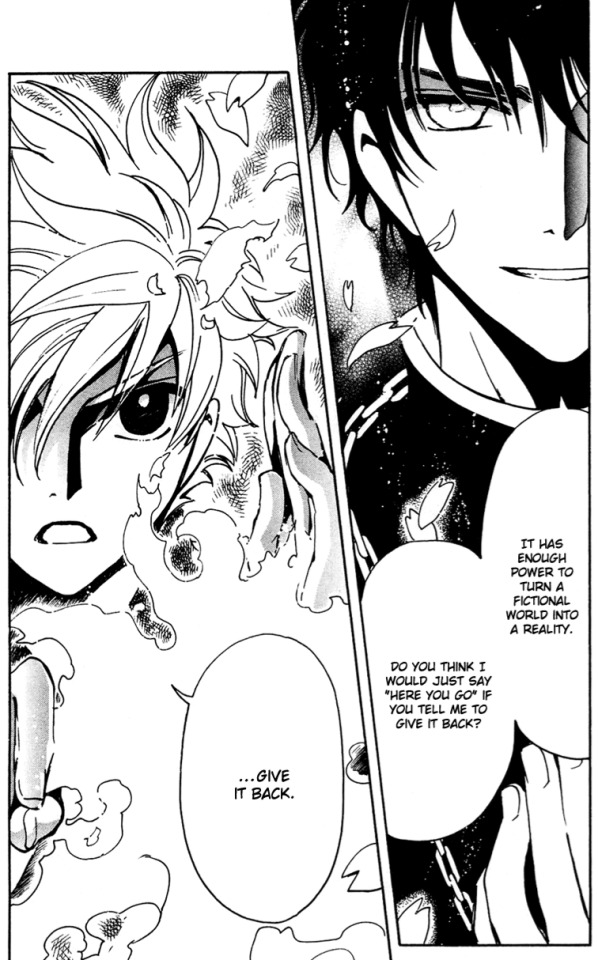
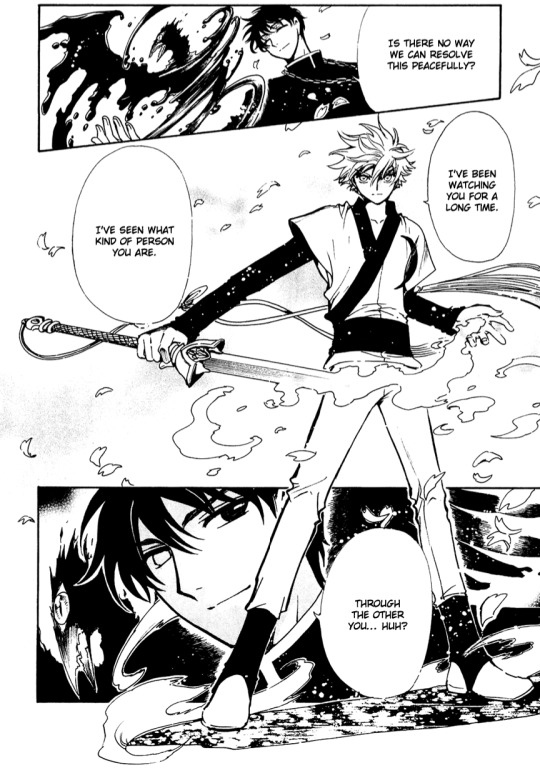
But why he didn't leave Nihon when Syaoran challenged him for feather fight? Well, if we go by easy answer: plot needs Syaoran to collect all feathers. One feather that stayed in Acid Tokyo turned out to be set in Clow Country as well because Acid Tokyo was its past.
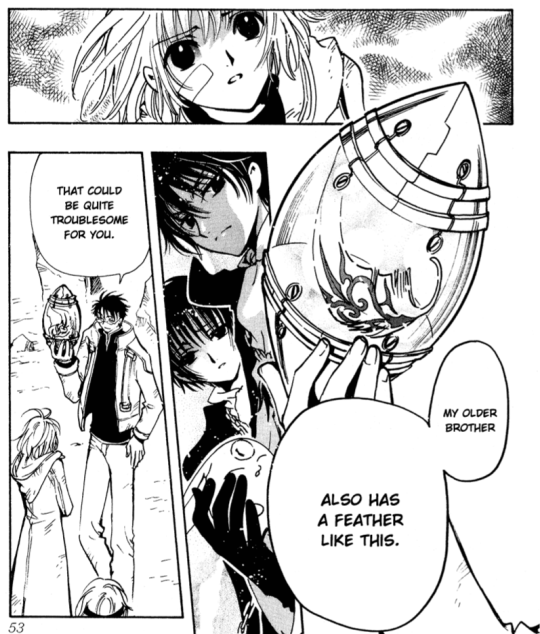
Fuuma didn't even mention Seishirou by name and Kamui is hissing, while holding Mokona. "How dare you mention that man in my presence?!?" While Subaru is... well you can see.
As Fuuma told Sakura, things could get quite troublesome for her and rest of crew as Seishirou was in possession of one of feathers. So some quick resolution had to be made.
But if we from character's psyche perspective: he probably wanted to fight Syaoran.
You have to understand: that man's love language is psychological torture.
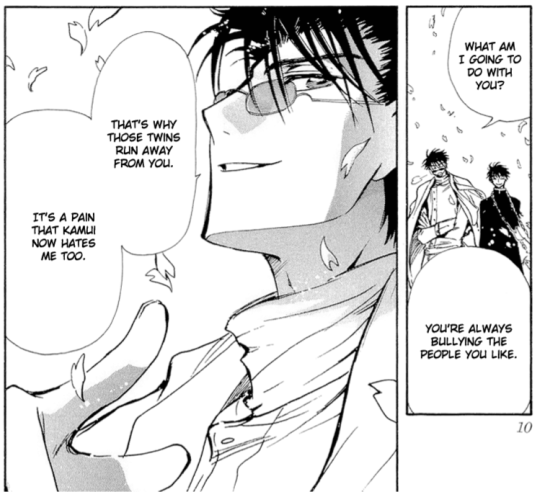
If someone catches his interest he bullies them and ruins their life (please go read Tokyo Babylon, it'll be self explanatory). So I wouldn't say it's too farfetched that he got interested in that whole clone/time loop thing with Syaoran and wanted to bully kid a bit. Because of course he would. That'll explain why he told Syaoran he won't give him the feather despite planning to do so from the very start.
As I mentioned before, Seishirou's only agenda (that we're aware of), is to catch up with vampire twins, or far likelier just Subaru. If he was in possession of a feather and TRC main crew was aware of it, they'd be looking for him. And trust me, Kurogane wouldn't hold back, he'd kill him if he has to. So I wouldn't say Seishirou is in danger by holding onto feather (that's presumably useless to him since he has no control over it) per se, but it has potential to complicate things for him in the future.
But keep in mind this is Seishirou we're talking about. Is it possible he gave the feather because of no concrete reason at all? Sure.
But is it as equally possible he has some hidden agenda? Of course.
World Chronicle isn't finished (it's just halted), maybe there it'll be revealed why he planned to give feather up from the start. If it's ulterior motive it probably has something to do with twins, like maybe alert Seishirou if twins and feather (which is with Sakura?) are in same country or something like that.
23 notes
·
View notes
Text
THREES THREES THREES:
Oh hello. I want to talk about the stylistic/textual role of Threes in The Raven Cycle.
Threes – as a general concept and as a number – are a major symbol and motif in the series. Maggie tells us that threes are important from the very first book: from Maura’s favorite saying being “good things come in threes” to Persephone telling Adam that “things are always growing to three or shrinking to three,” threes are discussed at length in the text of the narrative. Maggie also shows us that threes are important as a motif/symbol for important aspects of the story: three Raven Boys, three Fox Way women, three Lynch brothers, three main ley lines, three sleepers, etc. Threes are, textually, incredibly significant in The Raven Cycle, and we know this because we are shown AND told it throughout the entirety of the books.
We all know the significance that is given to threes in the story itself, but what I want to talk about is the usage of a thrice-repeated word or short phrase (going forward I’m referring to this as “Threes” or “a Three”) as one of Maggie’s writing signatures (across the series, there are 65 Threes). This creates a meta level to threes being an important aspect of The Raven Cycle universe. A classic example of a Three (one of my favorites, in fact) is from The Dream Thieves:
“As they walked, a sudden rush of wind hurled low across the grass, bringing with it the scent of moving water and rocks hidden in the shadows, and Blue thrilled again and again with the knowledge that magic was real, magic was real, magic was real.” (TDT, 12)
In a way, the Threes join the intradiegetic (what is happening within the narrative itself) with the extradiegetic (what the narration is communicating solely to the reader). The reader and characters are told explicitly that the number three is significant, important, notable, and powerful. In using Threes as a writing signature after giving the reader that information, the Threes are designed to signal to the reader that this line, this moment, is important.
So the question is: What Are The Threes Trying to Tell the Reader???
Amazing question.
In my recent TRC reread, I was already keeping track of Threes, because I was curious to see how many times they appeared. And then my sister, who was also rereading, said something interesting (after reading this Three from The Raven Boys):
“He was full of so many wants, too many to prioritize, and so they all felt desperate. To not have to work so many hours, to get into a good college, to look right in a tie, to not still be hungry after eating the thin sandwich he’d brought to work, to drive the shiny Audi that Gansey had stopped to look at with him once after school, to go home, to have hit his father himself, to own an apartment with granite countertops and a television bigger than Gansey’s desk, to belong somewhere, to go home, to go home, to go home.” (TRB, 370)
My sister said: “Adam’s like Dorothy.” And then she said: “Wait. Do you think the Threes are like a spell? Or… a wish?”
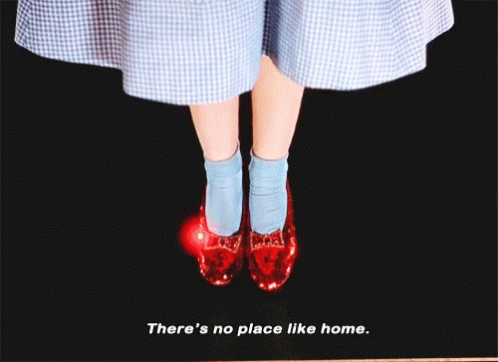
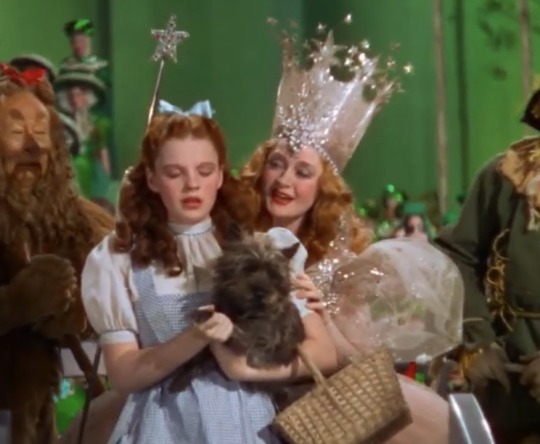
Which was……. Interesting.
What I have determined, after completing my reread and spending way too much time analyzing this, is that a Three is either a wish, a hope, a longing, a prayer – or, alternately, a warning, a curse, a negative promise.
In either sense, Threes are a foreshadowing of what is to come – whether it be good or bad. Threes exist to signal to the reader that they should be paying close attention to whatever is being said or observed.
Threes in….. Everything Else:
Before we get too far into TRC Threes, let’s talk about the precedent for three being an important number in art, math, storytelling, etc. I found some interesting information about how three is a satisfying number for the brain:
Grouping things in threes leverages the power of repetition to aid memory; denote emotional intensity or importance; and ease persuasion (research by Shu & Carlson (2014) found that three positive claims is the most effective for persuasion).
Three is the smallest number that the brain can still recognize as a pattern, and the brain loves pattern and repetition. This is true in visual art – having three main compositional figures to create a pleasing image – and also in storytelling and narrative. Using threes for repetition in storytelling is a very common occurrence.
Some classic examples of repetitive threes are Shakespeare’s “tomorrow and tomorrow and tomorrow” or Lincoln's “a government of the people, by the people, for the people.” In each of these examples, a repetition of three is used to create pleasing auditory rhythm. There is something inherently memorable about literary Threes.
Perhaps the most interesting information I found while digging into the precedent for threes is about the rule of threes in folktales. This information happens to come from Wikipedia (side note: Wikipedia is a modern tool of collective consciousness and we should utilize it more). This page describes how in its most basic form, the rule of threes in storytelling is just beginning, middle, and end. Because this is such a common convention, writers tend to “create triplets or structures in three parts.” It then talks more directly about the use of threes in folktales:
“Vladimir Propp in his Morphology of the Folk Tale, concluded that any of the elements in a folktale could be negated twice so that it would repeat thrice.”
This is especially interesting to me. The idea that an element of a folktale “could be negated twice so that it would repeat thrice” shows up prominently in the plot of The Raven Cycle – a book that is heavily influenced by folktale motifs – but also in so many of the folktales/fairytales we all know. A classic example of this would be Goldilocks and the Three Bears – Goldilocks must try porridge that is too hot, too cold, and then, finally, just right. The journey of these three actions is satisfying to the brain because it is a complete pattern: the third and final result of “just right” porridge is only satisfying because of the two “not right” porridges that preceded it.
Getting back to Stiefvater Threes:
For anyone who’s seen The West Wing (and even those who haven’t), here’s a good way to explain what I think the Threes are doing. You know that thing they do during a The West Wing “walk and talk” where two characters will be throwing information and little quips back and forth at each other rapid-fire, and then suddenly, they will both stop walking, and the camera will stop moving, and they’ll say a line that contains really important information that you need to know to understand the storyline of that episode? That’s what Maggie’s Threes are doing for the reader. That’s what 6:21 is doing for the characters. It’s intentional: the writers/directors/actors/camera operators on The West Wing know that they’re throwing a lot of information at you, and know that they need to get you to pay attention to the most important parts somehow, so they do it by forcing the viewer to lean in and listen. It changes the focus and energy of the scene from something with momentum to something that pauses, and therefore makes you pause.
The Threes compel the reader to pause and consider the information being delivered as more important than they might consider it if it was not written as a Three. “Maura’s expression was dark” does not read the same as “Maura’s expression was dark, dark, dark.” And in a text where characters directly state the magical importance of threes, compounded by three as an overarching motif, there is clear intention and meaning behind these written Threes.
In the context of TRC, Threes act as a fourth-wall break.
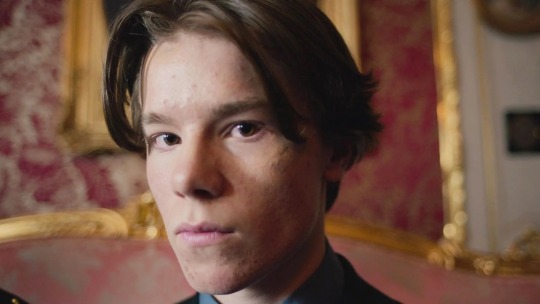
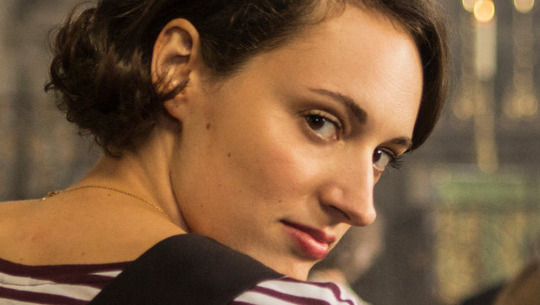
They are essentially a way to poke the reader and say: “Are you paying attention? Because you should be.”
These Threes use a symbolic motif – the rule of three – that is already heavily discussed in the text – to get the reader to pick up on the internal motivations of the character who is “wishing” their Three or the narration which is using a Three to foreshadow some important aspect of the plot.
The Threes are like the literary equivalent of a record scratch. It stops you in your tracks, breaking the established rhythm and making you take notice of what is being said in a new way.
Let’s Look at Some More Threes (but just a few don’t worry)!
1. We get a classic Three, and a very Gansey Three, right after the group comes out of Cabeswater:
“‘What about that thing in the tree?’ Blue asked. ‘Was that a hallucination? A dream?’
Glendower. It was Glendower. Glendower. Glendower” (TRB, 231).
Finding Glendower is one of Gansey’s core wishes, one of his core longings. Although this line is a literal answer to Blue’s question – he saw Glendower in the tree – in making it a Three, Maggie has given it added weight and meaning. It is prayer-like in its intention. It is almost an incantation: by saying it in Three, Gansey wishes it into being.
2. In The Raven Boys, after Gansey has bribed Pinter to keep Ronan at Aglionby and has learned that Noah has been dead the whole time they’ve known him, we are given this Three:
“The Pig exploded off the line. Damn Ronan. Gansey punched his way through the gears, fast, fast, fast” (TRB, 311).
This moment foreshadows what directly follows: a distinct lack of fast as the Camaro breaks down and Gansey is held at gunpoint by Whelk. This Three is not a prayer, but a warning, and an indicator to the reader that something important is about to happen. Had Gansey not been trying to go so “fast fast fast,” the car might not have broken down; because the Three incanted it, disaster follows.
3. To return to a Three I have already mentioned, but follows the typical Three structure:
“...to go home, to go home, to go home” (TRB, 370).
In this scene, Adam’s wish is less about actually wanting to return to his literal home, because his house was never really a home for him. Adam’s wish/longing is for a home that he could return to, that he would want to return to. He is longing for a place/feeling/experience that does not exist for him. The Three in this sentence comes after a string of active wishes/longings, and by ending with this Three, it casts a spell of sorts, honing in on the truest underlying wish that Adam has. In using the phrase “to go home” three times, the narrative is making sure you, the reader, know that this want, this need, this wish, is the most Important to Adam, and will drive his actions for the rest of his story.
Most of the Threes feel like this. They are often tacked on at the end of a sentence or embedded in a sentence. They’re an addendum to the action of the story. They’re like casting a spell – once to manifest, twice to charge, three to cast.
���..And Some Other Types of Threes:
Then there are the Threes that don't follow the typical pattern of the same word repeated three times one right after the other, but are still a Three in a different way.
There are short phrases/sentences that are repeated three times throughout a page or chapter. In the prologue of The Raven King, we get this:
“He was a king…
He was a king…
He was a king.
This was the year he was going to die.” (TRK, 1-3)
In this case, the Three acts as a promise of Gansey’s kinghood, but in ending the sequence with “this was the year he was going to die,” the promise of the three is given a condition: it is not going to be a joyful kinghood, but instead a kinghood intertwined with the death we’ve known is fated for Gansey.
One of Adam’s Threes from Blue Lily, Lily Blue, uniquely breaks the mold of Threes in a format that does not appear anywhere else in the four books:
“It was his father.
He opened the door.
It was his father.
He opened the door.
It was his father” (BLLB, 242).
❋ (We’ll talk about this one more in-depth later.)
There are also a few “unfinished” Threes:
In The Raven King when Ronan is having a nightmare (infected by the demon) about Matthew and the mask, he has this Three:
“Ronan’s throat was raw. I’ll do anything! I’ll do anything! I’ll do anythi
It was unmaking everything Ronan loved.
Please” (TRK, 96).
With the uncompleted Three, there is an uncast wish. Ronan’s wish is about Matthew, yes of course, but also about being willing to do anything to keep those he loves (ie. Adam, Gansey, Blue, his brothers) out of the reach of the “unmaking.” This unfinished Three serves to foreshadow the harm that does ultimately befall first Adam and then Gansey as a result of the unmaking of Cabeswater by the demon: without the Three spell completed, his wish is not fulfilled.
*This is Not all the uncommon/mold-breaking Threes, just a few that are interesting!
Do All Threes Come to Fruition???
The short answer is: No. Or at least not in that way.
Once again looking at the text of The Raven Cycle, we are given an answer of sorts. In discussing Gansey’s predicted death, Maura says:
“First of all, the corpse road is a promise, not a guarantee” (TRB, 155).
This seems to apply to Threes as well. Threes are not a guarantee. They are a promise. Not all Threes come to fruition the way one might expect – or at all, for that matter. The important part of Threes is not that they will definitely come true, it’s that they could come true, because the Three gives them the potential to come true.
Structure, Structure, Structure:
The main Threes structures are:
Three of the same word separated by commas:
“magic, magic, magic” (TRK, 59).
A short phrase/sentence separated by periods:
“My father. My father. My father” (TDT, 369).
A short sentence that is repeated three times throughout a page/paragraph:
“Gansey did not breathe…
Gansey did not breathe…
Gansey did not breathe” (TRK, 209).
A word that is repeated three times and is connected by “and”:
“Round and round and round!” (BLLB, 224)
Italics vs. Non Italics:
Italics in The Raven Cycle are often used for character’s inner thoughts/anxieties. This continues to be true in the context of Threes. A Three that is not written in italics indicates a promise, or some foreshadowing of a plot point being foretold through the Three – it is typically more “real” – whereas a Three that is written in Italics seems to indicate a wish/hope/longing that is unattainable in some way. Italics almost always indicate a Three that may never come to fruition, or at least not in the way the character hopes it will.
An example of this distinction can be found in chapter three (hah) (I don’t believe in coincidences and neither does Gansey) of The Raven King:
First we are met with Ronan wishing/hoping to return home:
“That morning, Ronan Lynch had woken early, without any alarm, thinking home, home, home” (TRK, 24).
This home, home, home, is in reference to the idea of home rather than the reality. Ronan is wishing to return to a home that does exist physically, but is not the same as in his memory – he wants to be at the Barns as it was in his childhood.
Then, in the very same chapter, Ronan actually returns home and we are given this Three:
“Slowly his memories of before — everything this place had been to him when it had held the entire Lynch family — were being overlapped with memories and hopes of after — every minute that the Barns had been his, all of the time he’d spent here alone or with Adam, dreaming and scheming.
Home, home, home” (TRK, 27).
This second home, home, home, is about the actual reality of being in his childhood home – the good and bad that has existed in the years since the childhood he longs for.
The Addition of AND:
The most notable use of “and” is in Noah’s very last chapter:
“Sometimes he got caught in this moment instead. Gansey’s death. Watching Gansey die, again and again and again” (TRK, 416).
When “and” is added into a Three, it becomes circular, cyclical. The “and” gives the Three a sense of infinity, or creates a loop of sorts.
This Three operates in the same way “tomorrow and tomorrow and tomorrow” does in Macbeth – it is meant to convey the endlessness of time, a relentless cycle of tomorrows.
❋ While there are not many of these Threes with “ands” in The Raven Cycle, there are other examples of Threes or Three-like occurrences that fulfill the same purpose as the “and.” For example, remember this Three:
“It was his father.
He opened the door.
It was his father.
He opened the door.
It was his father.” (BLLB, 242).
In this case, instead of the word “and,” the Three (It was his father) is connected by “he opened the door.” This Three is accomplishing the same feeling as “again and again and again” – the feeling of being caught in an endless loop.
Another example of an (implied) “and” in The Raven Cycle is: Gansey’s life. Gansey starts out alive and then dies as a child only to be reborn, and then killed again through his sacrifice, and then reborn for a final time. Gansey is Alive, Dead, Alive, Dead, Alive. And so Gansey’s life is a cycle of Three.
As with the Threes that contain “and,” Gansey starts where he ends: alive.
Other Ways Threes Show up in The Raven Cycle:
I will state the obvious once again: there are three Raven Boys, three Lynch brothers, three Fox Way women, three sleepers, three main ley lines (the lines that “seem to matter” to Glendower’s story), Gansey the Third (Gansey Three, Dick Three).
There are also the more obscure: the “three kinds of secrets” in The Dream Thieves prologue and epilogue; each Lynch brother inheriting three million dollars from Niall Lynch; the three figures with Blue’s face on the tapestry and later as a vision in Cabeswater; Adam and Gansey going to DC for three days; the shield pulled from the lake having three ravens embossed onto it; Ronan having dreamt Matthew at the age of three; the door to the Demon’s room needing “three to open” it; Aurora Lynch staying awake for three days after Niall died.
And of course, we have the ley line symbol/chapter header:
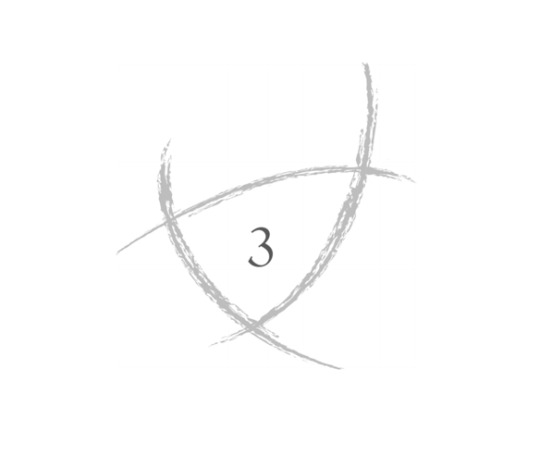
And then there are the 300 (three hundred!) Fox Way “villain” readings. (This was something that was particularly interesting to me.)
The first antagonist we meet is Whelk. When he comes for a reading at 300 Fox Way, he first pulls the Three of Swords.
When the women all draw cards together, they pull identical cards for Whelk: three of the Knight of Pentacles, then three of the Page of Cups. After drawing, essentially, three threes (the Three of Swords, then two sets of three matching cards) in this reading, the first Three of the entire series appears:
“Maura’s expression was dark, dark, dark” (TRB, 124).
The second “antagonist” we meet is the Gray Man, who comes to 300 Fox Way in The Dream Thieves to “observe.” Maura, Calla, and Persephone are predicting which card is on the top and bottom of the stack and the first card, predicted by Calla, is the Three of Cups off the top of the deck that Mr. Gray is holding (a remarkably happy card in stark contrast to Whelk’s Three of Swords).
When the third antagonist, Greenmantle, comes for his 300 Fox Way Reading he also draws the Three of Swords. The fact that each of the three antagonists come for a reading is in itself a sort of Three, but to further the importance of these moments, each of them draws some sort of three-related card.
All of the examples I have touched on have been more symbolic references to Three as a motif of the books as a whole. However, Threes also show up in the literal number of times important quotes are said/written.
I was tracking some of the most well-loved TRC lines to compile them, and noticed that the lines “don’t throw it away” and “safe as life” happen to appear exactly three times throughout the series. This was honestly pretty surprising based on the importance of those quotes – I would have assumed they showed up far more. Actually, they both appear twice in The Raven Boys and once in The Raven King. Threes, and the importance of Threes, is embedded so strongly into the narrative of The Raven Cycle that even the quotes we all think of as the most beloved of the series follow this rule of Threes.
Now, could you chalk some of these up to coincidence? I guess. But Gansey doesn’t believe in coincidences so I don’t either. So what’s the point of all these Threes?
Conclusion???
In a literal, literary way, Threes are a fourth wall break to make the importance of a moment obvious, but I’m not sure what the larger “point” of Threes is. My best analysis comes from the idea of The Raven Cycle being all about time and Threes playing into the importance of time as a sort of record scratch or loop. The Threes, as a stylistic, written motif, seem to connect the time-based cycle the characters experience to the time-based cycles the reader experiences by reading the books.
But my conclusion feels incomplete and so I would like to rely on the collective for this one – just about the most Raven Cycle thing you can do. So I’m asking you, the collective you, what conclusion would you draw? What do you think?
What I do know for sure is that Threes are magic, magic, magic.
For Your Convenience: Here is the textual significance given to threes within the books (chronologically):
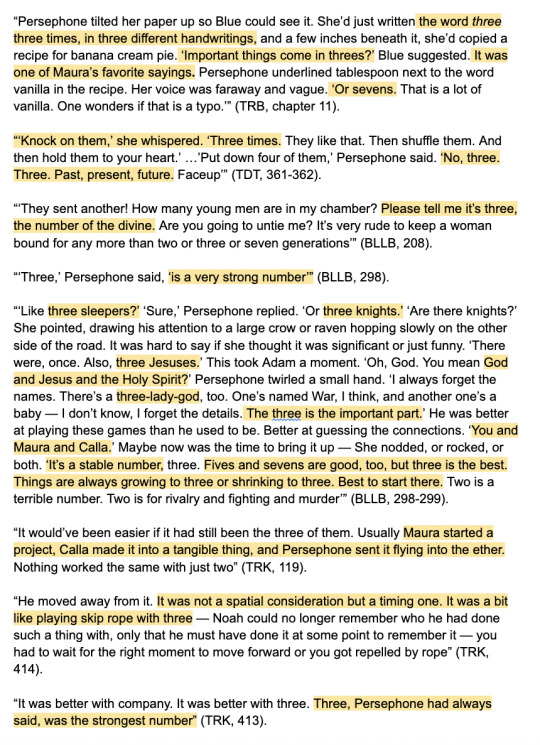
And here are the Threes, Threes, Threes (compiled):


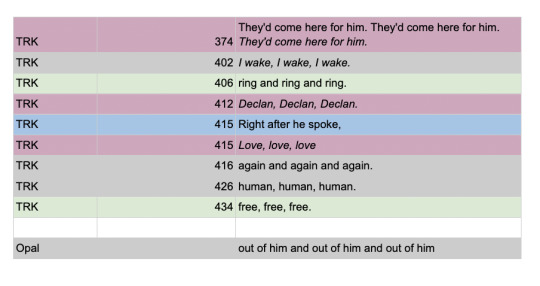
(If you made it to the end of all this, I love you. Have a gold star and a hug <3)
#sorry for the aggressive caps lock i wrote this in google docs#wow this is embarrassing#i'm okay with it#i spent my break writing a 16 page paper#the ganseyism of it all#some people asked for an essay so blame them not me#trc#trc analysis#maggie stiefvater#the raven cycle#the raven boys#the dream thieves#blue lily lily blue#the raven king#the gangsey#blue sargent#richard campbell gansey iii#ronan lynch#adam parrish#noah czerny#gangsey#mine
174 notes
·
View notes
Note
There's a terrible part of my brain that I hate that remains stuck on rovinsky mostly because it didn't happen so I'm never fully at peace thinking about what could have happened even though it was and would have been a dumpster fire dreamers trilogy didn't help that case at all though because ronan got so much worst the toxicity of it mmm
i'm constantly thinking about how if hennessy was a boy then ronan's horrific lindenmere gun violence murders at the end of cdth would've been foreplay.
#and thinking about how into it K wouldve been. rip dude you shouldve stuck around to see ur crush's negative character development#i'm like almost sorry for this but. they are insane#replies#rovinsky#horrible nightmare trauma pals#violence#trc#cdth
25 notes
·
View notes
Note
i still have lots of questions after reading greywaren right when it came out and i thought i could ask you... if youre not interested then just ignore me! i feel kinda dumb for not getting a few things
what was the sweetmetal maggie referred to? the one which was supposedly also in trc books?
why do ronan and declan look alike if ronan wasnt born the normal way? whatever created him certainly didnt care about how declan looked, right?
has ronan known that he is more than human? idk i kinda had the impression that he def didnt know about himself. he knew he was a dreamer, he obviously knew niall was is dad, so when and how did he learn about himself? thats what i completely missed somehow lol and how did adam get that too? when they were in the dream space?
what actually was the lace?
why did ronan have the nightwash? did it stop now after he knew what he was and saved the earth and all that? was it because he was too powerful and so he needed to be close to the power source aka ley line? and now he can be "free" bc he knows what he is and he chose to be human basically or more human with powers or such?
sorry i am still confused lol if you could help a dumb bitch out i would be very happy!!! some of these might be obvious but i really didnt get it. thanks so much <3
hiiii sorry for the late response. i haven't been around much. i can take a crack at these but i definitely don't know the answer to all of them LOL
no idea. i doubt she'll ever tell us
mór, niall, and the forest all created ronan together. his appearance was mór's contribution - it says she modeled him after a photo she had seen of niall as a toddler
i could be forgetting something but i don't think this is entirely clear in the book, i.e. i don't think there's any sort of inciting incident like ronan didn't know what he was and then this one specific thing happened and now he does. i think it was more of a gradual realization that came to him little by little during his time in the dream space. my understanding is that - being an ancient, all-knowing entity - he probably always had the capacity to "unlock" this knowledge but he had been pushing it down all his life because he wasn't ready to come to terms with it. his journey of self-acceptance in this trilogy culminates in him discovering who he is because he finally loves himself enough to handle the revelation. as for adam, i'm sure he understands that ronan is Something More because he's smart and because of their interactions in the dream space, but i don't think he knows exactly what that "something more" is. it probably has to be explained to him in detail off-page after the events of the book
i feel as though the lace is to hennessy as bryde is to ronan, i.e. a manifestation of all of her most negative thoughts and feelings. that's why it physically resembles the shadows from her most painful childhood memory. her suffering is so profound that this manifestation grows powerful enough to sustain itself in the dream space and affect other dreamers. i may be completely wrong but that's my understanding
nightwash doesn't only affect ronan - we know it happens to other dreamers, too, because hennessy also gets it when she doesn't dream. i think even after the events of this book, ronan would still get nightwash if he stopped pulling things out of his dreams. dreamers can't ignore what they are. he's "free" now in the sense that he accepts who he is; no more nightwash not because it doesn't exist anymore, but because he always allows himself to dream freely
#again these are only my thoughts and interpretations. i cant guarantee any of these are right lol#thanks for asking!#answered#anon#greywaren spoilers
11 notes
·
View notes
Note
it's the anon from before who said your posting got me to start reading trc!! I'm 17% of the way thru it so far and omg I'm LOVING it.. Adam is my fave so far .. I thought he would have black hair .. I want to pressure washer gansey (unsure if this is positive or negative)
ahh I’m glad!! congrats on being an adam guy also…boy i wish that were me…also black hair?? that is so wild…that dusty little guy…i sympathise with wanting to pressure washer gansey too just please be careful. because he’s wearing his boat shoes. also i don’t want him to get a headache :-(
#adam guys sit at the cool table during lunch 😔 gansey girls do not even get lunch we’re busy microwaving tea 😔#telegram#anon#trc
9 notes
·
View notes
Note
gw rating??? im glad you liked mor i want her
i want her too, anon…. i want her too….
general rating: 8/10 generational traumas
detailed, spoilery rating under the cut
it felt like half-dream, half-info dump??? which is partly why i'm still working out how i feel about it. it was definitely different from cdth and mi, in that the action-packed moments were more spread out. here, the action of the book takes place as much on the page as it does in our minds as we have to refigure what we know from the previous books with the knowledge we gained. reading the other books, i took a ton of pictures of the pages i wanted to comment on- i only had that urge once or twice while reading gw. (i'm sure other ppl have plenty of screenshots they'll post analysis of- i'm just not a big meta writer)
it felt like a more resolved and polished series ending than trk was to trc, and yet i'm not sure if that made it any more "satisfying." i may have preferred another chapter of immediate aftermath/a smaller timeskip over the epilogue we received- as much as i was glad to see my beloved sarchengsey and psychics for a brief moment, i'm not sure i wanted everything tied up so neatly and cutely as it was in that epilogue!
even though i was sure that nathan would end up being the actual antagonist after mi, that reveal didn't feel entirely "earned," in part bc we spent so much more time with bryde, delving into his philosophy and motivations. i have a lot of questions about him. i also wish we'd learned more about The Lace. those are the two things i think could have had more page-time.
i am realizing that this is awfully negative considering i gave it an 8, so here are the things i really enjoyed:
-as always, my beloved farooq-lane. mwah mwah mwah. impeccable.
-farooq-lane and hennessy's flirtation and general dynamic.
-hennessy getting to be a big damn hero (and not by suddenly not being crazy and shitty)
-ronan saving adam after everyone was predicting that adam would have a way bigger role in this book and save ronan. (not that he didn't help ronan come back to himself, he totally did)
-bryde and matthew's scenes made me crack up. i'm pretty sure @crimeronan called their dynamic to a t.
-the fact that it really did feel like a vivid dream
-mor shooting declan <3
-matthew punching declan <3
11 notes
·
View notes